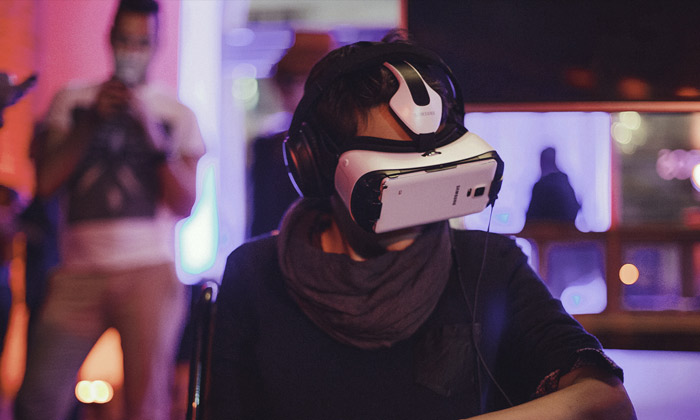Artistic mediums are generally defined or even created by the technologies that facilitate them. Virtual Reality (VR) stands as the next ‘big thing’ to fundamentally alter the way humans visually interact with almost everything. Taking a stroll through your favourite tourist destination, watching movies that unfold around you, or even seeing political debates from a front row seat are just the tip of the futuristic iceberg that is VR. Centre Phi’s latest exhibit, “21st Century Challenges (Les Enjeux du 21e Siecle),” sets out to demonstrate the awesome potential of VR, and the result is an intimate and powerful look at socio-political problems facing our world today.
Focusing on key contemporary issues, such as the Syrian refugee crisis and the Ebola epidemic in Liberia, the “Virtual Reality Garden,” offers museum patrons the chance to get as close as most will ever get to these regions. The exhibit features four documentaries, filmed and mastered specifically with VR in mind, that attempt to bring these potentially remote, or perhaps forgotten, issues closer to home, by placing viewers right in the midst of the action. Each film is displayed on a Samsung Galaxy Note 4 that is paired with a Samsung Gear VR headset. While VR technology has historically been surrounded by much skepticism in regard to its ability to fully immerse viewers, Nintendo’s infamous Virtual Boy stands as a case in point. The standard of technology today, coupled with the relatively low cost to produce it, has finally made it possible to feasibly approach that immersive sensation VR enthusiasts have been craving.
“Waves of Grace,” a United Nations-commissioned project directed by Chris Milk and Gabo Arora, makes masterful use of 3D spatial sound audio tracking to portray Liberia during the recent Ebola crisis. This method is captivating and allows the audience to face the tragedy head on. As the documentary traverses from schoolyards riddled with the sound of children’s play, marketplaces full of the cries of commerce, and hospitals overrun with incoming patients, all of the sounds of the film are adjusted according the positioning of the viewer’s head. This ultimately provides a much more ‘real’ experience than any newsreel could deliver. The viewer and the virtual world interact with each other in a powerful way. Their curiosity is engaged as they attempt to absorb what they can from the 360 degree scene evolving around them. As a result, a more personal and emotional attachment to the issues at hand becomes possible.
Perspective in the virtual world is crucial, as objects can feel intensely close or remotely distant just like they do in real life. “Nomands: Maasai,” directed by Felix Lajeunesse and Paul Raphael, brilliantly takes advantage of this phenomenon when depicting the vibrant heritage of the Maasai tribe. There are a few scenes in which the viewer sits face to face with some of the tribe’s members for an extended amount of time under an emerging canopy of stars far more numerous than any member of industrial society is used to. These scenes convey the most intimate moments in a way that regular cinema cannot. Staring into a real person’s eyes in such a way, while seeing every miniscule detail on their faces and the surrounding landscape, provides for a level of intimacy so palpable that it was almost awkward.
“Clouds Over Sidra,” also by Milk and Arora, provides a look into the daily life in a Syrian refugee camp from the perspective of Sidra, a 12-year-old child. This documentary, alongside “Inside Impact: East Africa,” which follows former U.S. president Bill Clinton’s endeavors for social development in East Africa, often place the viewer in a child’s perspective, behind a school desk, for example. These scenes provide a pleasant shift to a smaller perspective.
Ultimately, the Centre Phi’s VR Garden highlights the massive potential of virtual reality, all whilst bringing audiences face-to-face with important social questions in a powerfully intimate way that will surely become ingrained in one’s memory. The only way to understand the aforementioned films is to experience it for yourself.
“Twenty First Century Challenges” runs from Jan. 18 to Mar. 31 at the Centre Phi (407 Rue Saint-Pierre). Admission is free.









